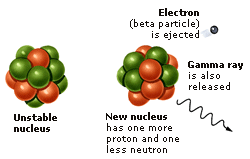Welcome back to the next series of Atoms! I really hoped you had fun in reading the previous post! Anyway, due to time constrain, I have fast forward the lesson to Isotopes!
So what exactly are Isotopes???? Hmmm...
Atoms of the same element can have different numbers of neutrons; the different possible versions of each element are called isotopes.
Refer to the previous post to recap on what is Neutron! :)
Hydrogen
The most common isotope of hydrogen has no neutrons at all; there's also a hydrogen isotope called deuterium, with one neutron, and another, tritium, with two neutrons.
You might now wonder how many Isotopes can 1 element have.
Well, sad to say that an atom cannot just have any number of neutrons. There are combinations of neutrons and protons, at which the forces holding nuclei together seem to balance best. Atoms with a few too many neutrons, or not quite enough, can sometimes exist for a while, but they're unstable.
So what is unstable in the above question?
Unstable atoms are radioactive: their nuclei change or decay by spitting out radiation, in the form of particles or electromagnetic waves.
Radioisotopes/ Radioactive Isotopes
That question above ^^^^^ leads me to the next topic, called radioisotopes!
It is well, sad to say that Radioisotopes are really really really (I mean really) dangerous.!!!
Because the like charges of the protons repel each other,there are always forces trying to push the atom nucleus apart. The nucleus is held together by something called the binding energy.
In most cases, elements like to have an equal number of protons and neutrons because this makes them the most stable. Stable atoms have a binding energy that is strong enough to hold the protons and neutrons together.
Even if an atom has an additional neutron or two it may remain stable. However, an additional neutron or two may upset the binding energy and cause the atom to become unstable.
In an unstable atom, the nucleus changes by giving off a neutron to get back to a balanced state. As the unstable nucleus changes, it gives off radiation and is said to be radioactive.
I'm sorry to say that the picture isn't clear, but I can tell you that it is giving out radioactive waves...Reminds me of the Bombing at Nagasaki. 0-0
Other facts
You'll get why I am showing you the Table :)
All elements with atomic numbers greater than 83 are radioisotopes meaning that these elements have unstable nuclei and are radioactive.
Elements with atomic numbers of 83 and less, have isotopes (stable nucleus) and most have at least one radioisotope (unstable nucleus).
As a radioisotope tries to stabilize, it may transform into a new element in a process called transmutation.
Uses of Radioisotopes
Shocking?!?!?! Yes, it can be used in medication you know! -Feign shock-
One major use of radioisotopes is in nuclear medicine. Of the 30 million people who are hospitalized each year in the United States, 1/3 are treated with nuclear medicine.
There are nearly one hundred radioisotopes whose beta and/or gamma radiation is used in diagnosis, therapy, or investigations in nuclear medicine. The most used radioisotopes were discovered before World War II.




